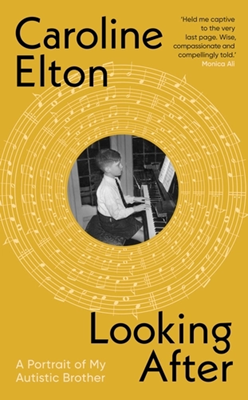Non-fiction
Looking After: A Portrait of My Autistic Brother
By Caroline Elton (2025); Penguin
“Meet Lionel, Caroline’s older brother. Born in the late 1940s, when little was known about autism […] When Lionel’s mother dies, and shortly after he is diagnosed with cancer, his two sisters struggle to fill the void – to become Lionel’s caretaker and support him as they had promised their mother. Looking After is both a portrait of one autistic man’s remarkable life, and a heart-rending story of how one family learnt to care for each other, to deal with loss and to be by each other’s side at the very end” – Penguin

brother.do.you.love.me.
By Manni Coe and Reuben Coe (2024); Canongate
Sunday Times Bestseller. Waterstones non-fiction book of the month, March 2024. Shortlisted for Book of the Year at the British Book Awards.
“Reuben, aged 38, was living in a home for adults with learning disabilities and struggling to accept that he had Down’s syndrome. Depressed and in a fog of anti-depressants, he hadn’t spoken for over a year. Increasingly isolated, cut off from everyone and everything he loved, Reuben sent a text message: ‘brother. do. you. love. me.’ When Manni received this desperate message from his youngest brother, he knew everything had to change. Together they began an extraordinary journey of repair, rediscovering the depths of their brotherhood, one gradual step at a time.” – Canongate
Sibling review
This beautiful and emotional book tells the story of two brothers, Reuben, who has Down’s syndrome, and Manni, during a difficult time. It’s a story of love, vulnerability, and the healing power of connection. Manni’s writing is gentle and honest. He shares their journey with care, offering glimpses into their past and the challenges they’ve faced. While there are joyful moments and signs of progress, there’s also a quiet sadness that runs through the narrative, one that many siblings will recognise. As someone with a younger sibling who also has Down’s syndrome, I found this book incredibly relatable. It echoed parts of my own experience, some comforting, some challenging, and made me reflect on how I support my sister. There were moments that inspired me to try new things, and others that made me feel seen in my frustrations and hopes. I had the chance to hear Manni speak before reading the book, which added depth to the experience. His sincerity comes through both in person and on the page. This isn’t a typical book review, it’s a recommendation from one sibling to another. If you’ve ever felt alone in your role, or wondered if others understand the unique bond and responsibility that comes with being a sibling to someone with additional needs, this book is for you. Highly recommended. Whether you’re a sibling, caregiver, or simply curious about the adult sibling experience, Brother. Do. You. Love. Me. offers a rare and moving perspective.
Review by adult sibling Lisa
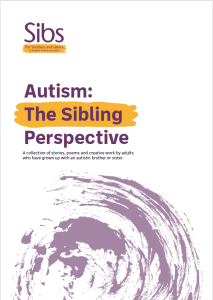
Autism: The Sibling Perspective
By Sibs (2024), download your copy
20 adult siblings have shared 20 different experiences through their stories, poetry and art in this collection that spans the highs and lows of sibling life.
Sibling review
The collection offers insight not only into what it’s like to have an autistic sibling, but what autism actually is – when you read the collection, you’ll learn more about how the autistic siblings the authors know & love express themselves; how autism shapes their sibling relationship; and how the experience of being autistic and society’s attitude to autism has changed over the decades. Prepare for an emotional rollercoaster, with some pieces being absolutely heartbreaking and others being laugh-out-loud funny. This work is honest, and each piece shows many different kinds of love shared between siblings, even when their minds may work differently. When you Google “autism”, one of the first results that appears is from the NHS website. It reads: “Autistic people may act in a different way to other people”, and states things that autistic people may “find hard” in a bullet-point list, such as communication, feeling empathy, tolerating loud noises, and coping with change. I wouldn’t say any of that is wrong necessarily – and, after all, I’m not a doctor. However, my sister can’t be summed up in a bullet-point list. This collection offers a chance to learn about autism from the voices of people who love, live with, share history with, and care about autistic people. It paints a picture of how autism, in all its variety, shapes families, and I feel it does this in a way that is more engaging and real than reading medicalised definitions that still remain prevalent in how people discuss autism. It is genuinely so refreshing. Whether you are autistic, have a sibling who is autistic, or have a sibling with another kind of disability or neurodivergence, the collection is a great way to discover more about autism and feel connected to our sibling community. I really hope you love it! Review by adult sibling Rachel
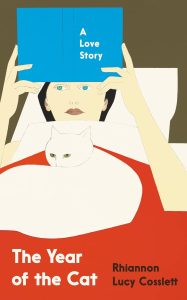
The Year of the Cat: A Love Story
By Rhiannon Lucy Cosslett (2023); Tinder Press
“When Rhiannon fell in love with, and eventually married her flatmate, she imagined they might one day move on. But this is London in the age of generation rent, and so they share their home with a succession of friends and strangers while saving for a life less makeshift. The desire for a baby is never far from the surface, but can she be sure that she will ever be free of the anxiety she has experienced since an attack in the street one night? And after a childhood spent caring for her autistic brother does she really want to devote herself to motherhood?” – Tinder Press
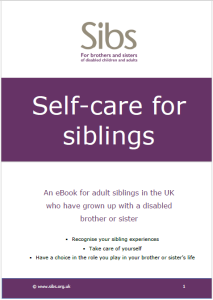
Self-care for Siblings
By Sibs (2020), download your copy.
Are you an adult sibling who grew up with a disabled brother or sister? Do you ever feel that other people just don’t ‘get’ what life as a sibling is like? Do you find it hard to make time for yourself? Then our eBook “Self-care for siblings” is for you. Written by siblings, for siblings, it will help you to recognise your experiences, make time for yourself and have a choice in the role you play in your brother or sister’s life.
Sibling review
An exhilarating and supportive journey that exemplifies the reasons why sibling self-care is so important. Woven throughout are opportunities for reflection and practical prompts as to how even the busiest of siblings can, and should, prioritise their own emotional health and wellbeing. An easy to digest eBook that could be read in one go, or, as I did, picked up and put down with reflection time in between each emotive chapter. Before reading this book, being a sibling carer and sibling self-care felt like a contradiction in terms. My role is, and has always been, to care, not to be cared for! Reading this book has made the impossible seem possible. It has, for the first time in my life, validated my self-care and helped me to understand I am not alone. It has explored experiences, feelings, and emotions, unique to sibling carers. Made me proud, added value to all I do, and have done, but also helped me to see that in order to do the best for my brother, I need to care for myself too. I wish that every sibling knew about this book, and that every friend, family member, and employer, were able to read it to fully understand our world. To respect our unique position and to give all siblings the support and respect required to carry on the amazing sibling caring role that they do.
Review by adult sibling Lucy
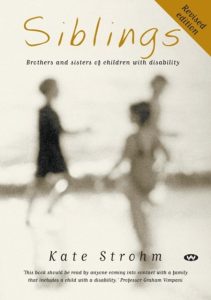
Siblings: Brothers and sisters of children with disability
By Kate Strohm (2014); Wakefield Press
Earlier version also available: Being the Other One: Growing Up with a Brother or Sister Who Has Special Needs’ by Kate Strohm (2005); Shambhala Publications Inc.
“Siblings tells what it is like to grow up with a brother or sister with a disability or illness. The siblings of children with a disability are often the overlooked ones in families struggling to cope. Kate Strohm, a sibling herself, bravely shares the story of her journey from isolation and confusion to greater understanding and acceptance. She provides a forum for other siblings to describe their challenges and provides them with strategies to make sense of their experiences.” – Wakefield Press
Sibling review
I realise that a short summary / review of a book cannot include countless quotes and little else but that is exactly what I found myself wanting to write because there are so many sentences in this book that perfectly describe my own feelings as a sibling of a disabled person: “I wanted to make life easy for my parents to make up for their pain” “It was clear that at some point the development of my identity had been hindered” “I had a very strong sense that (bad/difficult/tragic) things just happen”. Siblings is a really comprehensive exploration of being a sibling based on Kate’s own life and also includes descriptions of different emotions and situations from other siblings. There are brief summaries and possible solutions at the end of each chapter so it’s easy to refer back to particularly relevant bits. The third part of the book is strategies which may help with some of the challenges of being a sibling. I recommend reading this book if you want to explore some of your own experiences growing up as a sibling and how it affects you as an adult. It may touch on some uncomfortable or sad feelings but for me it has helped to make sense of so much.
Review by adult sibling Sarah-Jane
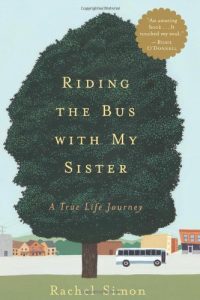
Riding the Bus with My Sister: A True Life Journey
By Rachel Simon (2013); Grand Central Publishing
“Rachel Simon’s sister Beth is a spirited woman who lives intensely and often joyfully. Beth, who has an intellectual disability, spends her days riding the buses in her unnamed Pennsylvania city. The drivers, a lively group, are her mentors; her fellow passengers are her community. One day, Beth asks Rachel to accompany her on the buses for an entire year. This wise, funny, deeply affecting true story is the chronicle of that remarkable time. Rachel, a writer and college teacher whose hyperbusy life camouflaged her emotional isolation, had much to learn in her sister’s extraordinary world.” – Hachette Book Group

The Music Room
By William Fiennes (2009); Picador
Costa Book Awards shortlist 2009.
“William Fiennes’ childhood was one of imagination and curiosity, bounded only by the horizon he saw from the roof-tiles of his ancient family home. His older brother Richard, known for his towering presence, his inventiveness, his great passion for Leeds United, and his suffering due to severe epilepsy, was an adored and charismatic figure in his life. Years later, eager to understand his brother’s mind as fully as the ancient trees and secret haunts of his own journey towards adulthood, William Fiennes has written a profoundly moving account of his home, his family’s care, and above all, of Richard. The Music Room is a luminous testament to the miracle of consciousness and to the permanence of love.” – Picador
Please note: Includes descriptions of violence.
Sibling review
This beautifully written book has three interwoven strands: the moated castle home, his relationship with his epileptic older brother Richard and the history of epilepsy. They twist together elegantly, and I found symbolic significance in the way that they were always discussed separately, and yet form one novel: as siblings, we too have very separate components to our lives. I was particularly moved by the inclusion of Richard’s emotional variations stemming from his disabilities. Fiennes shares the constant change from warm and loving to violent and harsh, a tricky area to navigate for siblings. He doesn’t hold back in revealing that sometimes he liked these moments of tension, of being able to wind his sibling up like a more conventional relationship or how it gave him more attention from concerned parents. Not only was this so relatable, but it was also the first time I have seen this in any book. The Music Room continues into adulthood, and Fiennes talks about conflicted priorities as he grew older between his brother and the wider world. Again, it just felt so relatable and is a moving novel of love, family and loss. At its core, The Music Room is a book entirely focused on siblings, a rare gem of understanding from an author who has been there too. I found it an easy read to pick up and put down – perfect for winding down before bed. There are no chapters, just four parts divided by the strands, which makes for effortless reading.
Review by adult sibling Freya
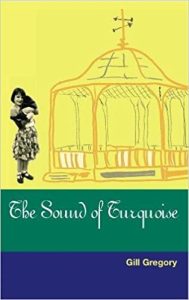
The Sound of Turquoise
By Gill Gregory (2009); KUPress
“Gregory creates a space through The Sound of Turquoise to explore her childhood memories, of the relationship with her disabled brother Andrew and her Grandfather Alexis. She uses Meg, the protagonist, to enable her to revisit her experiences which perhaps were too painful to address directly. In doing so, it gives the story a slightly fictional less biographical feel.”
Sibling review
Gregory creates a space through The Sound of Turquoise to explore her childhood memories, of the relationship with her disabled brother Andrew and her Grandfather Alexis. She uses Meg, the protagonist, to enable her to revisit her experiences which perhaps were too painful to address directly. In doing so, it gives the story a slightly fictional less biographical feel. This is a subtle, beautifully written multi-pronged story of family relationships, migration and your place in history. Readers with siblings who live with disabilities will resonate with Meg. Her deep love for her brother, her desire to protect him but also her feelings of embarrassment, confusion and guilt are all too real. However, Gregory cleverly intertwines memories of Andrew with a recounting of her Grandfather’s escape from war-torn Uzbekistan in 1904. This changes the stories direction at well-appointed intervals, stopping the story from becoming too self-reflective or melancholy. Gregory vividly describes the attitudes and perceptions of the time (mainly 1900-1960), giving a strong sense of the people who frequented each period, from the terrible events leading to migration at the turn of the century through to the newfound freedoms of the modern era. Ultimately it explores how trauma continues to run through and influence family generations from the vantage point of the future. Very touching and compelling.
Review by adult sibling Jenny
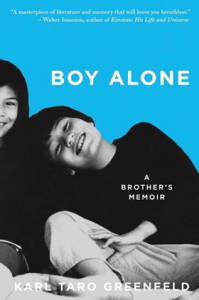
Boy Alone: A Brother’s Memoir
By Karl Taro Greenfield (2009); Harper
“In this literary tour de force, Karl Taro Greenfield, the acclaimed journalist and author of China Syndrome, tells the story of his life growing up with his brother, chronicling the hopes, dreams, and realities of life with an autistic sibling” – Harper
Fiction
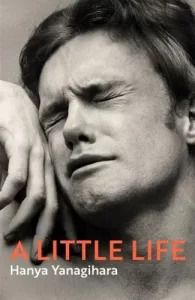
A Little Life
By Hanya Yanagihara (2022); Picador
Winner of Fiction of the Year at the British Book Awards. Shortlisted for the Booker Prize. Shortlisted for the Women’s Prize. Finalist for the US National Book Award for Fiction.
“In her 2015 novel A Little Life, American author Hanya Yanagihara tells, rather beautifully, of a sibling relationship between Willem and the late Hemming.”
Sibling review
In her 2015 novel A Little Life, American author Hanya Yanagihara tells, rather beautifully, of a sibling relationship between Willem and the late Hemming. Their Icelandic father and Danish mother emigrated to the US from Sweden and raised the boys in Wyoming, Hemming, who died as a young adult, was severely disabled and pre-verbal. Writing from Willem’s point of view, Yanagihara describes Hemming with tenderness, and conveys Willem’s deep love for his brother. The episode only takes up a couple of pages in a 750-page novel but it made an impression on me. Yanagihara notably focusses exclusively on Willem’s feelings, treating them as a separate entity unconnected to the parental relationship with the disabled child. A Little Life was a huge bestseller on both sides of the Atlantic, and was turned into a West End play.
Review by adult sibling Sara
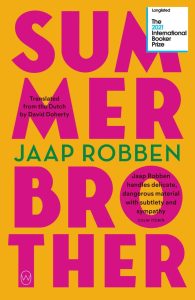
Summer Brother
By Jaap Robben, translated from the Dutch by David Doherty (2021); World Editions
Longlisted for the 2021 International Booker Prize. Winner of the 2022 Vondel Translation Prize (UK).
“Thirteen-year-old Brian lives in a trailer on a forgotten patch of land with his divorced and uncaring father. His older brother lucien, physically and mentally disabled, has been institutionalized for years. While Lucien’s home is undergoing renovations, he is sent to live with his father and young brother for the summer. Their detached father leaves Brian to care for Lucien’s special needs. But how do you look after someone when you don’t know what they need? How do you make the right choices when you still have so much to discover?” – World Editions
Sibling review
Teenager Brian comes from a dysfunctional family; his parents are divorced and he lives with his conniving father in a trailer home, located in a remote Dutch landscape. He is the only child on the site. When Brian’s physically and mentally disabled brother, Lucien, who lives in a care home, needs to be relocated due to building renovations, their dad sees a financial opportunity and arranges for Lucien to spend the summer with them in their trailer. But their dad is often not around, leaving Brian to take care of Lucien. This is an account of a young teenager who is unwittingly put into a position of having to take care of his older disabled brother, learning about Lucien and his many and varied needs as the days progress. Brian is accepting of Lucien’s world which includes others in Lucien’s care home, interacting with Lucien and others in an innocent and non-judgemental way. He is gentle and loving toward them, even when forced to undertake unpleasant tasks. Brian is clever, caring and connected to others’ needs. This is a lovely and sweet tale of sibling love, told without sentimentality. The reader is left with the sense that Brian is not a hero, as contemporary cliché dictates – he is simply acclimatising to his new normal.
Review by adult sibling Pam.
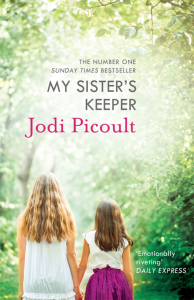
My Sister’s Keeper
By Jodi Picoult (2018); Hodder
“In all thirteen years of Anna’s life, her parents have never given her a choice: she was born to be her sister Kate’s bone marrow donor and she has always given Kate everything she needs. But when Anna is told Kate needs a new kidney, she begins to question how much she should be prepared to do to save the older sibling she has always been defined by. So Anna makes a decision that will change their family forever – perhaps even fatally for the sister she loves.” – Hodder
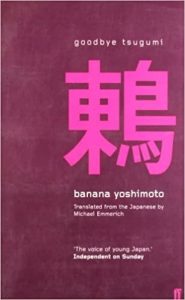
Goodbye Tsugumi
By Banana Yoshimoto (2002); Faber & Faber
“Maria is the only daughter of an unmarried woman. She has grown up at the seaside alongside her cousin Tsugumi, a lifelong invalid, charismatic, spoiled and occasionally cruel. Now Maria’s father is finally able to bring Maria and her mother to Tokyo, ushering Maria into a world of university, impending adulthood, and a ‘normal’ family. When Tsugumi invites Maria to spend a last summer by the sea, a restful idyll becomes a time of dramatic growth as Tsugumi finds love, and Maria learns the true meaning of home and family. She also has to confront both Tsugumi’s inner strength and the real possibility of losing her”
Sibling review
Maria, the narrator, explores her cousin Tsugumi’s relationship with the rest of her family and the wider community. Tsugumi has a lifelong debilitating physical illness and the two cousins have been bought up as siblings, making this book feel so relatable. The frustrations of challenging behaviour, the constant worry of relapses and the different perspective a disabled sibling gives you are all explored in this novel. I felt that Yoko, Tsugumi’s older sister, mirrored many characteristics that I see in myself too and it was empowering to see her character’s strength celebrated. Yoshimoto’s softly nostalgic tone made it feel like a friend chatting to me in cafe about experiences which feel entirely relatable. I recommend this book if you want an easy-going, heart-warming read that finally makes you feel heard. Review by Freya, adult sibling
Children’s books, also enjoyed by adult siblings
Many adult siblings find it helpful to read children’s books, as it can help to ‘fill the gap’ of something they didn’t have (but would liked to have had) as a child. Take a look at our children’s booklist here.
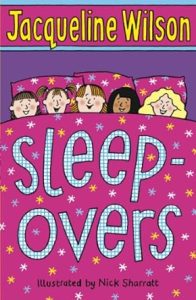
Sleepovers (2008) and The Best Sleepover in the World (2023)
By Jacqueline Wilson; Young Corgi
Whilst these books are aimed at 7-10 year olds, we’ve included them here as many adult siblings will still relate to the content from their childhood. The main character Daisy, has a physically disabled sister, Lily, who uses Makaton to communicate.
Sibling review
Daisy has recently started at a new school and is keen to fit in with her new set of friends – nicknamed the ‘Alphabet Girls’ thanks to their matching initials. The gang includes potential future best friend Emily, as well as the spoiled and bullying Chloe, who never misses a chance to make Daisy feel small. When the group take turns to celebrate their birthdays with sleepover parties, Daisy begins to feel anxious. She hasn’t told anyone about her sister Lily, who is non-verbal, with physical and developmental disabilities. As her own birthday grows nearer, she finds herself questioning if she should invite them over and whether they will accept her big sister. This short book, aimed at younger readers, skilfully blends in big themes in an accessible, sophisticated way. Readers can experience Daisy’s conflicted emotions towards her sister, the impact of caring on family life and the skills and challenges gained from being a sibling. Wilson has a great insight into the importance of fitting in and belonging in the formative primary school years. I read this book as an adult, at a time when I was struggling to find any literature that reflected my own experiences. Although my circumstances are quite different to Daisy’s, I gained a lot of comfort from the theme of acceptance, as at the time I felt isolated and ashamed of my embarrassment towards my autistic sibling’s non-conforming behaviour. Without any spoilers, the story ends on a moving and positive note, and you may shed a tear. It would benefit both Sibs and their “non-Sib” friends to read this compassionate gem of a story.
Review by adult sibling Liz
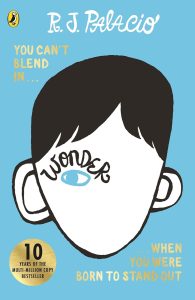
Wonder (2012)
By R.J.Palacio; Penguin Random House
“August Pullman was born with a facial difference that, up until now, has prevented him from going to a mainstream school. Starting 5th grade at Beecher Prep, he wants nothing more than to be treated as an ordinary kid—but his new classmates can’t get past Auggie’s extraordinary face. Beginning from Auggie’s point of view and expanding to include his classmates, his sister, her boyfriend, and others, the perspectives converge to form a portrait of one community’s struggle with empathy, compassion, and acceptance.”
Sibling review
Wonder is a beautifully written story about Auggie, a young boy with a complex syndromes and facial disfigurements. The beauty in this book lies in the variety of perspectives that it is told by, highlighting the diverse networks that surround all individuals. Most relatably is the perspective told by Via, Auggie’s loving and patient older sister. It is refreshing to see her perspective told and for her character to shine through. She cares deeply for her brother and understands his additional needs and the time that takes away from her parents, but does get frustrated when preciously carved out time with her parents is disrupted by her brother’s needs yet again. It is touching to see them navigate this together, just like all sibling dynamics, and grow closer because of it.
Review by adult sibling Freya

